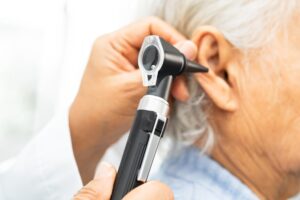It’s a common joke among parents and children, as well as one between couples — but is selective hearing real? What does it really mean? And, if it is real, what can one do about it?
Thanks for visiting the Colorado Ear Care blog. This is a space we’ve created where we can provide insight on a wide variety of topics pertaining to hearing, dizziness and balance, tinnitus, as well as the testing, treatment, and other related concerns. In today’s installment, we’re tackling a subject most all of you are likely familiar with: selective hearing.
Selective hearing has become a colloquialism amongst many families, affectionate or otherwise, in reference to our hearing what we want to hear in a given situation. You know the drill: honey-do lists, interrupting screen time to come down for dinner, and calls for help with household chores, among many other tasks often seem to fall on metaphorical deaf ears just when you need assistance the most. Sound familiar? It sure does to us! But let’s go beyond our anecdotal experiences and explore the science, if any, behind this common experience.
Selective hearing: Is it real?
In short, yes. But it’s not exactly what we refer to it as in our day-to-day interactions, even though we’re experiencing it constantly. You might be surprised to find that there is extensive research on the concept of selective hearing, also known as “selective auditory listening” in some circles, dating back to the 1950s. This area of research was pioneered (in separate capacities) by British cognitive scientists named Colin Cherry and Daniel Broadbent, and, for a time, was referred to as “the cocktail party phenomenon” in reference to one’s ability to listen and comprehend sounds in noisy environments filled with similar, competing sounds.
These studies were also inspired by contemporary air traffic controllers, who were fed information by multiple pilots through a single speaker, making the job one that was difficult, required a great deal of focus, attention, and the ability to clearly distinguish between many sounds in order to keep all involved as safe as possible.
Broadbent continued his research throughout the 1950s and in the mid-60s, a graduate student of his named Anne Treisman applied his teachings and improved upon them, developing a model that would shape our understanding of selective listening for decades to come.
What does the study of selective listening tell us?
One thing that this study indicates that amazes us is how quickly our brain is able to process information to make sense of the world around us. For instance, we often find ourselves in environments, such as restaurants, where servers, music, kitchen noise, and conversations being had with us and around us are all competing for attention.
In what seems like immeasurably short periods of time, our auditory system and brain are able to perceive, assess, and interpret the information that is most important to us. We can focus our attention on a server taking our order while folks chatter and the hustle and bustle of the restaurant goes on simultaneously. What’s more we still are capable of diverting and focusing our attention in an equally short period of time should the circumstances change, such as someone calling our name from across the restaurant or a busser dropping dishes on the floor.
In more recent studies, researchers are studying brain impulses to determine whether or not our brains filter out extraneous stimuli in order to focus on what is referred to as “target sounds.”
Does selective hearing matter to my overall hearing health?
Our auditory system and brain are receiving, processing, and communicating information all of the time, so it makes sense that having the healthiest hearing possible is beneficial to your selective listening, keeping you focused, aware, and in some instances, safe.
Let us be clear: selective hearing is not a disorder. It is a natural occurrence that our auditory system and brain participate in to help us make better sense of the world. In that sense, it’s quite the opposite of a disorder, it’s more an aid to our experiencing the world in a richer way. Perhaps it’s in the way that we sometimes choose to apply our selective hearing (in as much as we can control it) that might get us into trouble from time to time.
What are my options in promoting better hearing health?
At Colorado Ear Care, we feel that it is our mission to help everyone in our care to hear, feel, and live their best. Education is crucial to achieving the best possible outcomes, just as is having access to the testing and treatment you deserve.
In order for you to make sure your total ear health is everything it can and should be, we encourage all our patients to schedule annual exams, so we can address any potential issue related to your hearing, dizziness and balance concerns, or even the effects of tinnitus. Why?
We believe that your hearing and ear health should be treated in the same manner your vision and dental health is, and that is through the regular assessment, testing, and taking advantage of the recommended treatments that your respective specialists can offer. Just as glasses can help with your vision or twice-yearly cleanings support better oral health, these hearing testing and technology can lead to a longer life with better hearing!
The verdict.
So, is selective hearing a real thing? Yes, but it’s not exactly us hearing the things we want to hear; it’s more our brain hearing and interpreting the things we need to hear. The other stuff — the honey-dos, the chores, etc. — might be out of the area of expertise, but when it comes to your hearing health, Colorado Ear Care will always be by your side to provide the best education, testing, and treatment solutions you can find in our community. That’s our promise to you!




